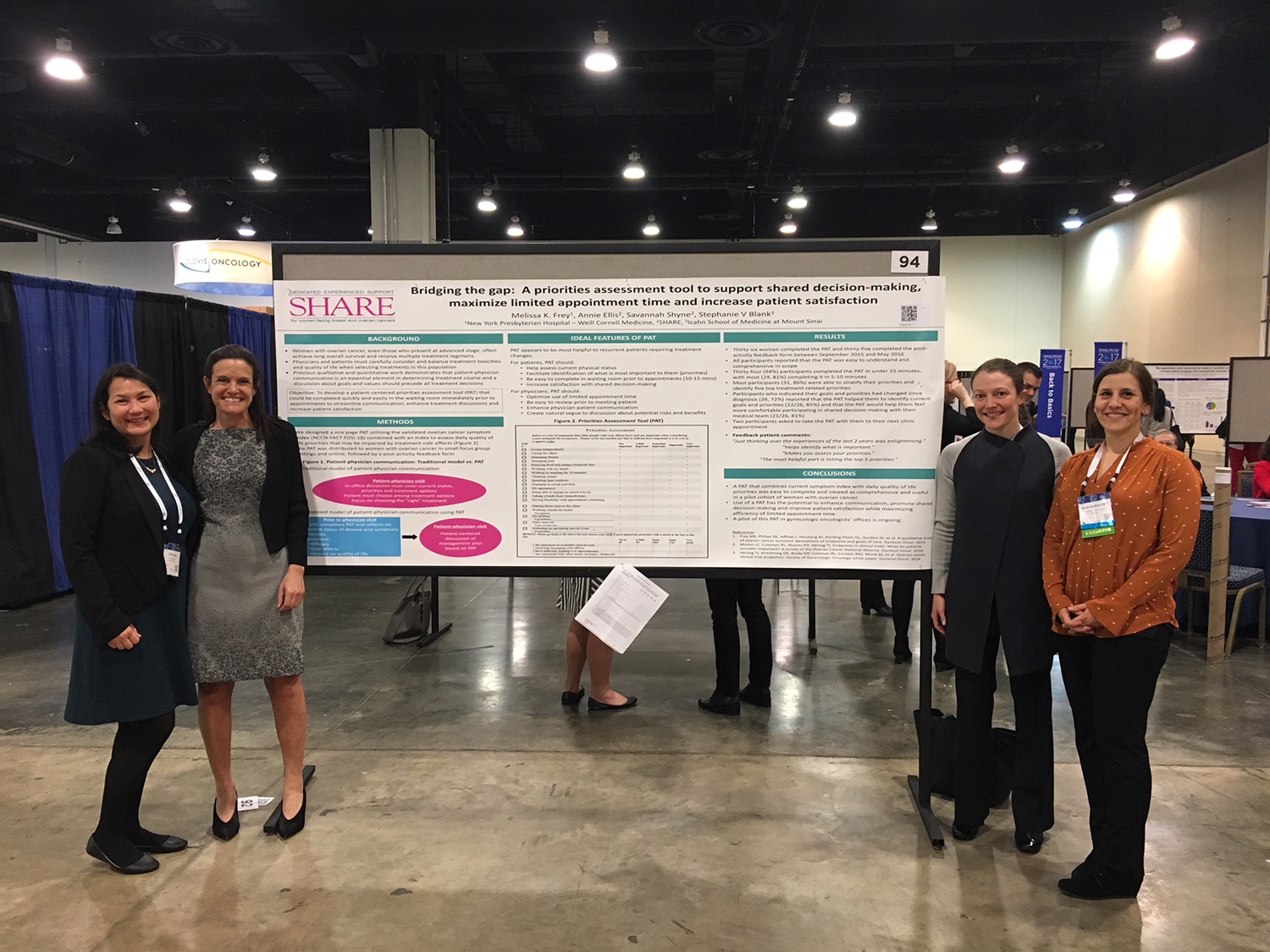In 2004, at age 40, Annie Ellis was diagnosed with stage IIC ovarian cancer. In the first four years after her diagnosis, she navigated two recurrences, received three surgeries and five different chemotherapy regimens, and joined a phase I clinical trial.
Each time Ellis’s treatment for ovarian cancer failed, it was an anxious time for her. Making decisions about treatment is difficult. For patients like Ellis, who go through multiple lines of treatment for their recurrent cancer, it can be even harder.
Today Ellis, a research advocate living in White Plains, New York, has been in remission for more than 10 years. She is collaborating with gynecologic oncologist Stephanie Blank at Mount Sinai Hospital in New York City and other researchers to study how to help other patients with recurrent cancer have better conversations with their doctors as they choose among treatment options.
Ellis and Blank connected in 2010 at a cancer survivors course held by the Foundation for Women’s Cancer at New York University in New York City. After hearing Blank talk about how her patients sometimes minimized side effects when talking with their doctors, Ellis introduced herself, and the duo hit it off. Both wanted to explore the communication gap between physicians and patients with recurrent cancer, so they decided to work together. Blank says, “It’s a great collaboration [working with survivors] and it gives a whole other perspective to research.”
Every patient wants to maintain good quality of life and minimize side effects, Ellis says, but what that means to each individual is different. There isn’t always enough time to fully discuss a patient’s personal priorities during an appointment with a doctor. In addition, Blank says, patients can get so distressed or distracted during an appointment that they forget to discuss their own expectations and goals.
First, Ellis, Blank and their research collaborators launched a focus group and then a survey to learn more about the experiences of ovarian cancer survivors. They found that only 14 percent of patients discussed their goals with doctors before choosing a treatment plan, and that patients’ tolerance for side effects decreases as the disease progresses. The results were published in Gynecologic Oncology in 2014 and 2017.
As patients, “what’s important to us changes,” says Ellis. Sometimes doctors might withhold treatment options from a patient based on their earlier understanding of the patient’s priorities, even though the patient is now willing to try more aggressive treatment. Or a patient may have an upcoming trip or special event and want to avoid losing her hair during a specific time period.
To help facilitate more conversation about patients’ goals, Ellis, Blank and their collaborators designed a patient-centered communication tool: a short questionnaire to assess goals and priorities of ovarian cancer patients that can be filled out in the waiting room. The questionnaire asks patients to rate from 1 to 5 the importance of different things—such as “my appearance,” “caring for others,” and “making fewer trips to the clinic.” They also include some open-ended questions, for instance, asking about any special future event the doctor should know about. A pilot study to test the tool will launch at Mount Sinai Hospital in the summer of 2018.
Ellis explains the team’s thought process behind the questionnaire: “If you can at least let the patient reflect on how they feel in a very simple way, and then talk about what is important to them, that will help them, number one, to have thought about that information when they speak with the doctor and, number two, if the doctor has that information, that can direct the visit.”
Blank says the new tool “will allow patients to … get more personalized care and things that would be more aligned with their goals.”
So far, patients like the tool, Ellis says. “[I]n the situations where we don’t know what the right [treatment] is … making the decisions this way, putting the patient first, and thinking about how the patients want to live is an empowering position for the patient.”
Their pilot study will also ask for doctors’ feedback. If the doctors find the decision-making tool helpful, too, then Ellis, Blank and their collaborators will launch studies on a larger scale.
“I think doctors and their patients need to work together, and that helps each patient to end up with the very best care,” says Blank.
Ellis hopes the tool can eventually help all patients with chronic diseases, not just cancer. “Instead of treating the disease,” she says, “you are really treating the patient and putting the patient first.”
Cancer Today magazine is free to cancer patients, survivors and caregivers who live in the U.S. Subscribe here to receive four issues per year.





